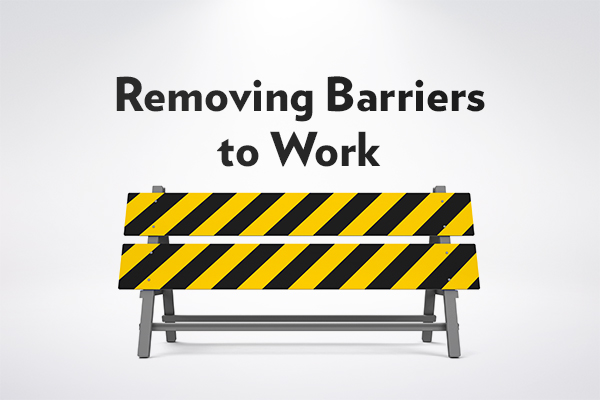Memo

Removing Barriers to Work for Ex-Offenders
Pennsylvania has the highest incarceration rate in the Northeast and a 3-year recidivism rate of nearly 61 percent. While recent reforms have sought to address these problems, research shows one of the most critical components of successful re-entry is a job. But for 255 Pennsylvania occupations, state licensing laws stand in the way.
Ericka Miller is a mom and youth minister who worked for several years in a local hospital. She took out student loans to become a cosmetologist and achieve her dream of opening a salon with her daughter. But Ericka’s license application was denied due to a felony conviction for trying to break up a fight outside her Philadelphia-area home. Ericka was forced to go to court to prove her “good moral character.”
Vague statutes and wide sweeping licensing bans are preventing ex-offenders from going to work, making it more likely they’ll re-offend. A recent study found states with the highest occupational licensing burdens saw their recidivism rates rise 9 percent over a three-year period. In contrast, states with minimal licensing saw recidivism rates decline by 2.5 percent.
Overall, the National Employment Law Project ranks Pennsylvania minimally effective at removing unnecessary barriers for ex-offenders. Pennsylvania maintains an outdated practice called automatic licensure bans for individuals convicted of a drug-related felony.
Automatic Licensure Bans
Many jobs in health care, including massage therapy, are completely closed off to those with drug-related felony convictions for 10 years under Pennsylvania’s mandatory licensure ban.
- 13 of the 29 licensing boards in Pennsylvania apply automatic 10-year felony bans.
- Other licensing boards can deny licensure to applicants with criminal records.
The growing number of Pennsylvanians with felony convictions combined with a growth in licensed occupations is leaving large swaths of the job market off-limits to ex-offenders. For example, the Department of Labor and Industry lists licensed occupations such as nurses and accountants as high-opportunity careers in almost every Pennsylvania county.
- Approximately 4 to 5 percent of Pennsylvanians had a felony conviction in 2010, up from 2 to 3 percent in 1980.
- Over 1 in 5 of Pennsylvanians must obtain a state-issued occupational license to work. In the 1950s, approximately 1 in 20 workers throughout the U.S. required a license to work.
Other Job Barriers Faced by Ex-Offenders
State laws also impose restrictions on where individuals with criminal records can work (e.g., those with a felony cannot work in facilities regulated by the Older Adult Protective Services Act), where they can live, and if they can recover their driving license.
In addition, many high-demand occupations, such as carpentry and trucking, require credentialing that disqualifies those with criminal records, much like automatic licensing bans. For example, any criminal conviction in the past two years automatically disqualifies an individual from obtaining a commercial driver’s license (CDL).
Pennsylvania Solutions
Nationally, states are pursuing reforms to help ex-offenders to find quality jobs in state-licensed fields. Since 2015, 16 states have revised their occupational licensing laws.
In June, Governor Wolf proposed ending the 10-year bans for anyone convicted of a drug felony and recommended eliminating 13 licenses. A month later the State Board of Veterinary Medicine voluntarily eliminated the automatic ban for vet techs and Senator Anthony Williams proposed legislation to eliminate 300 hours of cosmetology school for natural hair braiders.
Additionally, Pennsylvania should:
- Repeal All Automatic Bans: This is a critical step towards creating a licensing process that assesses each applicant’s unique credentials and circumstances.
- Eliminate Vague Statutory Terms: Licensing boards in Pennsylvania use vague and subjective language that can serve as an automatic ban for former offenders. Examples include “good moral standing” and crimes of “moral turpitude.”
- Strengthen Scope of Inquiry Requirements: Pennsylvania limits licensing boards to consideration of felonies and occupation-related misdemeanors. The law can be improved by eliminating consideration of older offenses, lesser offenses, and felonies unrelated to the occupation under consideration.
- Offer Preemptive Evaluation: Seven states have laws allowing anyone with a criminal record to petition a licensing board for a determination of whether their record will disqualify them from licensing. Petitioners can request evaluation at any time, including before they enroll in an expensive training program. See model legislation.
- Continue to Reassess the Value of Occupational Licenses: Recently states from Michigan to Nebraska to Rhode Island have eliminated occupational licenses for nutritionists, auctioneers, nurses, massage therapists, lab scientists, audiologists, and barbers/cosmetologists.
- Pennsylvania should establish a sunset board or further identify unnecessary licenses that are holding Pennsylvanians back. See model legislation on page 6.
Conclusion
Ericka Miller’s story has a happy ending. With the help of a free legal clinic, she took the licensing exam. She and her daughter are now the proud owners of a beauty salon, benefitting their family and their community. With many alternatives to state licensing, such as voluntary certification, and the high cost of re-incarceration or welfare dependence, lawmakers should be eager to enact sensible licensing reforms and prevent unnecessarily denying opportunity to ex-offenders.